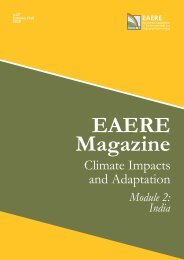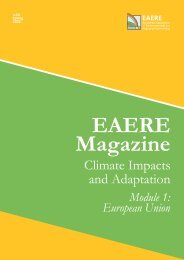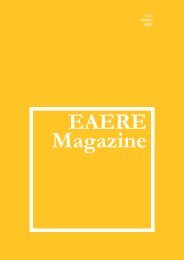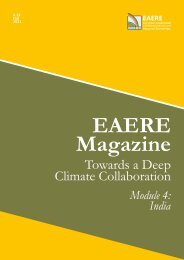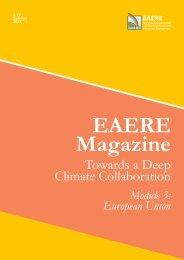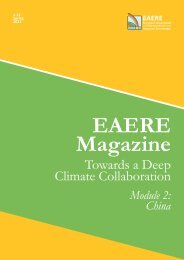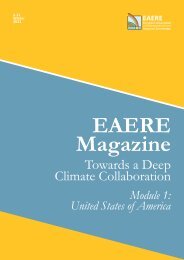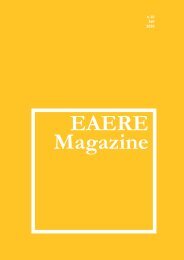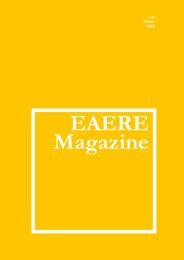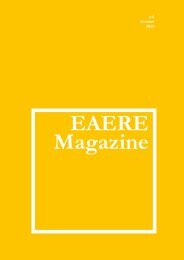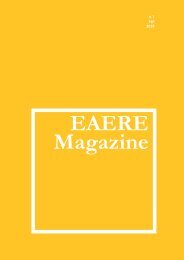You also want an ePaper? Increase the reach of your titles
YUMPU automatically turns print PDFs into web optimized ePapers that Google loves.
Before and after – how<br />
<strong>EAERE</strong> transformed our<br />
discipline<br />
Alistair Ulph<br />
Alistair Ulph graduated from the University of Glasgow in 1968 and the<br />
University of Oxford in 1970. After spells at Oxford University, Stirling<br />
University and Australian National University he joined Southampton<br />
University in 1979, becoming Professor of Economics in 1985. He was<br />
Deputy Vice-Chancellor at Southampton University from 1995-2001,<br />
and moved to the University of Manchester in 2003 as Vice-President<br />
and Dean of Humanities. He retired in 2010, becoming a part-time<br />
Research Professor in Economics. He was elected Fellow of the Royal<br />
Society of Arts in 1999, President of <strong>EAERE</strong> 2000-2001 and is an <strong>EAERE</strong><br />
Fellow.<br />
My academic career as an environmental<br />
and resource economist before retirement<br />
in 2010 spanned 40 years, 20<br />
prior to <strong>EAERE</strong>’s first conference and 20<br />
after, and in this article I want to give a<br />
sense of how different the two eras were.<br />
My interest in environmental and resource<br />
economics began in my postgraduate<br />
years in Oxford in the late 1960s,<br />
when I wrote a thesis on the economics<br />
of the mining industry, starting from Hotelling’s<br />
classic paper on the economics<br />
of exhaustible resources. The topic remained<br />
one of my interests during the<br />
1970’s, when there was a lot of public interest<br />
in the issue arising from the OPEC<br />
oil price shocks and concerns about the<br />
long-term sustainability of economic<br />
growth. During a spell as research fellow<br />
in the mid-70s at the Centre for Resource<br />
and Environmental Studies at the Australian<br />
National University I worked on<br />
theoretical models of imperfect competition<br />
with exhaustible resources, empirical<br />
work on estimating the demand for<br />
energy in the Australian manufacturing<br />
sector, using what were then relatively<br />
new flexible functional forms, and some<br />
valuation work on the benefits of one<br />
of Australia’s national parks. I also got<br />
involved in policy issues, such as the<br />
design of systems for taxing resource<br />
rents, of obvious relevance to Australia.<br />
In 1979 I returned to the UK to take<br />
up a post at the University of Southampton.<br />
The post was one of very few<br />
then earmarked as being in the field of<br />
environmental and resource economics.<br />
It was the post vacated by David Pearce<br />
when he left Southampton for a chair at<br />
the University of Aberdeen, then the hub<br />
of the UK offshore oil-industry. I continued<br />
working on empirical models of<br />
imperfect competition and the oil market<br />
(with funding from BP), and models<br />
of energy demand, funded by the Department<br />
of Energy. I also got involved<br />
in projects related to climate change,<br />
such as assessing the effectiveness of a<br />
carbon tax and evaluating the costs of<br />
sea level rise in the south of England.<br />
I mention all this because throughout the<br />
1970s and 1980s much of my research,<br />
like that of most environmental and resource<br />
economists, was focussed on<br />
work with colleagues in my own department.<br />
In those years, environmental and<br />
resource economics was a rather niche<br />
area in which only a small number of<br />
UK economics departments had anyone<br />
working in the field. I also did research in<br />
labour economics and industrial economics,<br />
and it was more usual to be asked to<br />
give seminars in those fields than in environmental<br />
and resource economics.<br />
The position was much the same in other<br />
European countries. There were two<br />
main ways of meeting and interacting<br />
with other environmental and resource<br />
economists outside the UK. One was by<br />
presenting papers at large general economics<br />
conferences, such as the annual<br />
meetings of the European Econometric<br />
Society, where they might have a particular<br />
session on a topic in environmental<br />
and resource economics. It was at such<br />
meetings that I first met Michael Hoel<br />
and Cees Withagen, for example. The<br />
second route to meeting other environmental<br />
and resource economists was to<br />
be invited to give a seminar or attend a<br />
small specialist conference organised by<br />
22<br />
22



